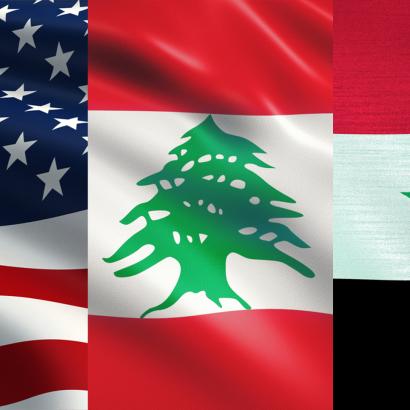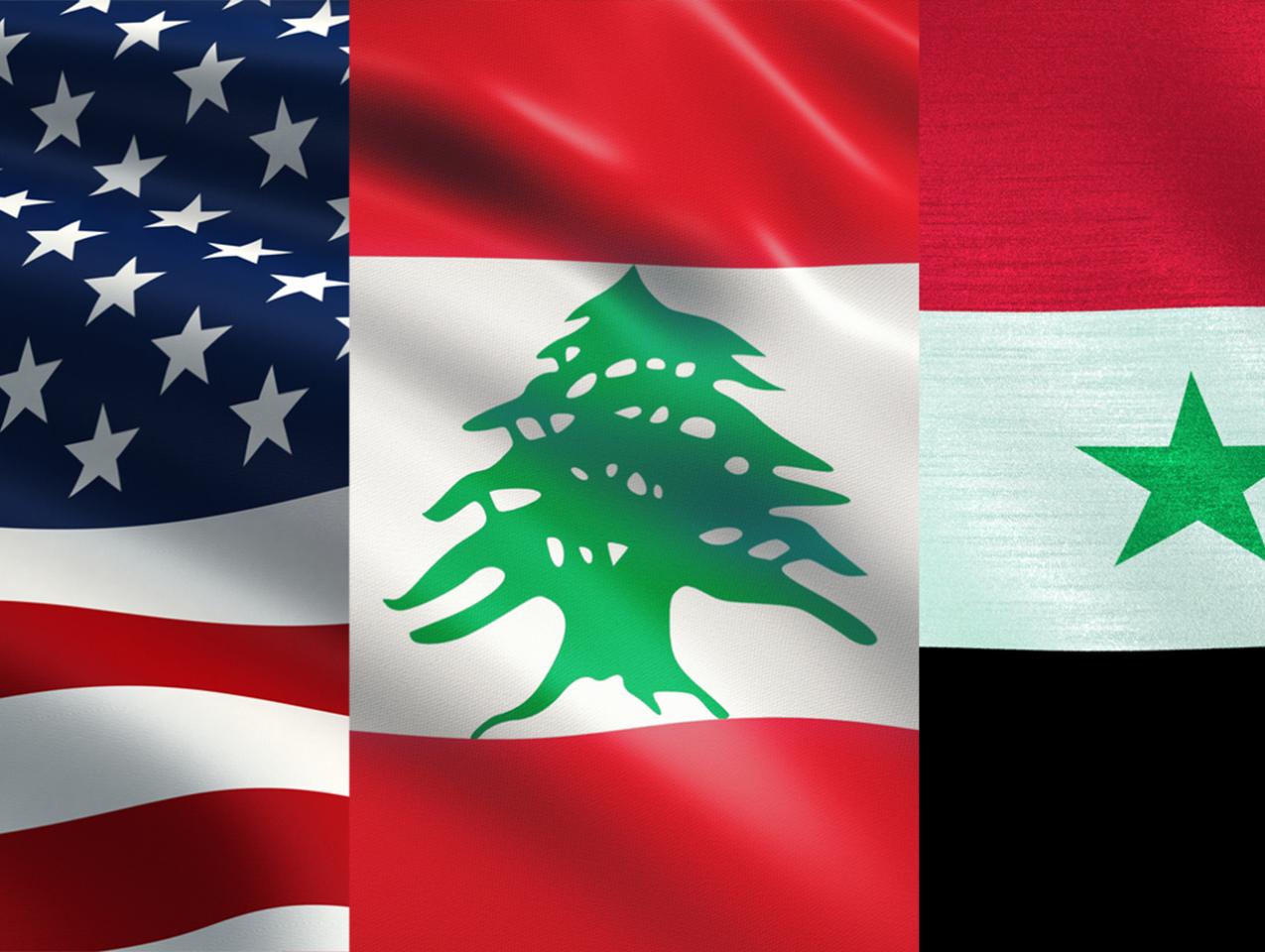- Middle East
- Revitalizing History
Along the highway that leads from Beirut north to Baalbek, the ancient city of Heliopolis and the site of the spectacular ruins of the Temple of Zeus, you reach a point where suddenly a series of billboards lines the road, and the familiar face of Vladimir Putin stares down at you as you drive past. It would be hard to describe his expression as friendly exactly, but the Arabic-language text on the signs conveys a warm greeting from Russia. Not far, across the mountains to the east, lies Syria, a Russian client state of sorts. Damascus is less than two hours away. Toward the northwest, a similar drive would get you to Tartus and then via the Syrian coastline to Latakia, where Russia has established its naval presence in the eastern Mediterranean. Three decades after the collapse of the Soviet Union, Russia is actively trying to reacquire its former spheres of influence, returning as a major player in the Levant. This assertion of power on the part of Putin poses a direct challenge to the network of US partners in the region. It is therefore also a threat to US security, but this Russian encroachment takes on special significance in light of Lebanon’s domestic crisis which deserves greater attention from Washington. Let's take a closer look.
Lebanon's problems are legion. The financial crisis has led to a 90% loss of value in the Lebanese pound, and those who have money in savings accounts are prohibited from withdrawing their funds from the banks. Stories of armed efforts to retrieve a depositor's own savings abound. These "bank robbers" have become folk heroes. In the meantime, many Lebanese survive thanks primarily to remittances from relatives living abroad. As the financial system crumbles, the physical infrastructure is eroding too, notably in the northern city of Tripoli where houses are collapsing for lack of attention to structural problems. Throughout the country public utility services have also ceased to function. Electricity is only available from private generators, with the cost of fuel rising dramatically. Some consumer items and especially many vital medical supplies are simply not available. The talented personnel who used to contribute to the enviable quality of Lebanese hospitals and universities are doing their best to leave in search of stability and appropriate remuneration elsewhere, especially in the Gulf countries, increasingly in Egypt and further afield as well. Others--without capital or international networks--make desperate efforts to flee the country illegally by boat, heading for Cyprus, but too often drowning in the Mediterranean. The country is collapsing, but the political leadership remains unwilling to take the necessary reform steps, since precisely those reforms would mean ending their own reign of corruption.
The slow-motion implosion of Lebanon deserves closer attention from Washington, not only because of the domestic human suffering which of course must elicit sympathy, but also because of the potential international repercussions. Most obvious, the further collapse of Lebanon would unleash a new wave of refugees, presumably traveling into Cyprus or Greece or otherwise into Europe, and although Europe has absorbed many fewer refugees than Turkey, Jordan or Lebanon itself, a significant step up in new arrivals is bound to exacerbate the festering political conflicts in Italy, Germany, France and elsewhere. An influx of refugees from Lebanon will inevitably pose a threat to the political stability of America's European allies. In order to avoid far-right electoral victories in Europe--far-right and therefore pro-Russian--the challenges in the Middle East and especially Lebanon need attention. The Biden administration's diplomats should be worrying about this connection.
Second, even the small flow of refugees from Lebanon raises the prospect of an accelerated spread of cholera. This epidemic originated in Syria, but by now more than a thousand cases have been registered in Lebanon. Cholera disseminates due to unsanitary conditions in agriculture, food handling, and the water supply, precisely the sort of conditions emerging due to the collapse of Lebanese infrastructure. Of foremost importance, one should determine how to provide adequate health care to those directly affected already. However other consequences also deserve consideration: if cholera were to reach Europe in the wake of refugee arrivals, the political response will be brutal. Unfortunately, policy development in the State Department stovepipes the regions, as if the Middle East and Europe had nothing to do with each other. Because of the bureaucratic structure, US foreign policy ignores the very real trans-regional connections.
Third, the generalized collapse of order and economic security are a recipe for terrorism. ISIS and other Sunni radicals have never been far away, right across the Syrian border. In addition, the multi-denominational character of Lebanon-- and the proximity of Sunni and Shia communities--could invite a return to sectarian violence. As a result, a splintering of the country might ensue, with the dwindling Christian population--it is disproportionately the Christians who are fleeing the Lebanese disaster--opting for an autonomous regionalism or even a secession. Separatist movements could reignite the Civil War, with all the attendant damage to the social fabric in Lebanon, and with repercussions in the larger region likely. (The debate over the alternative futures of Lebanon, as decentralized and federalist or unified and centralized, is played out in contributions to this Caravan collection: see the comments by Achkar and el-Husseini)
Finally, the erosion of Lebanese stability will ultimately provide Hezbollah, the radical Shia movement, a proxy of Iran, an opportunity to seize power directly. To date, Hezbollah has preferred to act outside the government, while nonetheless controlling it as a kingmaker of sorts. This arrangement has allowed it to exercise control without bearing any governmental responsibility. At some point, however, Hassan Nasrallah, the head of Hezbollah--or his masters in Tehran--may just decide that the time has come to seize power openly. Direct Hezbollah rule would mean that Iran would have finally established its toe hold on the Mediterranean. Already some Lebanese refer to Hezbollah and the Iranian presence as "the occupation," i.e., the control of the country by a foreign power. A Hezbollah-ruled Lebanon will be attentive to directives from Tehran, but it will cooperate with Moscow as well; the remaining ties to Washington will wither.
None of this is in the interest of the US. Certainly, the rise of the Chinese threat means that the US must pay greater attention to the Indopac region. Yet it would be foolish to understand the "pivot to Asia" as necessitating the abandonment of other regions. The Middle East continues to be vital to American global interests. America's primary security architecture partner, Europe, is directly vulnerable to instability in the Middle East, which enhanced US engagement could counteract. Meanwhile the US has good reason to push back against the intrusion of Russian power. Nor should it be forgotten that Lebanon is located next to US partners Israel and Jordan, and within striking distance from NATO ally Turkey. A degradation of the situation in Lebanon threatens that network as well. Expect Russia to take advantage of Lebanese instability; inaction from Washington will not make things better.
Those billboards of Putin on the road to Baalbek are clear indications of Russian ambitions and a direct challenge to American influence. Lebanon is a front in the war with Russia: at this point, Lebanon may not be an active theater like Ukraine, but it is an important piece in the puzzle of the Russian strategy to expel the US from the region. To resist that effort, the US needs to take proactive steps to stabilize the country. It should build on the many pro-American assets in Lebanese society, while providing needed support to the vital institutions that link Lebanon to the West: the hospitals, the universities, and the army. Lebanon is a small country, but it deserves increased US attention in the context of America's global competitions.

















